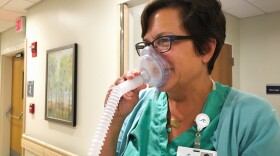
Kristin Gourlay
Kristin Espeland Gourlay joined Rhode Island Public Radio in July 2012. Before arriving in Providence, Gourlay covered the environment for WFPL Louisville, KY’s NPR station. And prior to that, she was a reporter and host for Wyoming Public Radio.
Gourlay earned her MS from Columbia University’s Graduate School of Journalism and her BA in anthropology from Lewis & Clark College in Portland, OR.
She’s won multiple national, regional, and local awards for her reporting, and her work has aired on NPR and stations throughout the country. She’s particularly proud of the variety of protective clothing she’s had to wear on assignment, including helmets, waders, safety goggles, and snowshoes.
Originally from Chicago, IL, Gourlay loves music, cooking, and spending time with her family.
-
Since the Supreme Court overturned Roe v. Wade in 2022, numerous states have banned abortion. Here are the states with bans or severe restrictions in effect, on hold or pending.
-
Parents with disabilities often face extra issues with remote learning. A deaf mom whose first language is American Sign Language is navigating the challenge of monitoring her hearing child's work.
-
The Affordable Care Act covers 8 million millennials through Medicaid expansion, insurance exchanges, and the ability to stay on a parent's plan until age 26. The GOP health bill limits some options.
-
One part of the federal health law gave hospitals financial incentives to improve patient care. Some invested big to make those changes and are worried about what losing that support would mean.
-
Move over, epidurals, here comes nitrous oxide. After enjoying popularity in the U.S. for managing labor pain until the mid-20th century, it was dropped in favor of anesthesia. Now it's back.
-
Most of the millions taking prescription painkillers are older than 45, research shows, and there's been a recent increase in drug overdose deaths among people over 55. Drug mixing is partly to blame.
-
More babies are being born dependent on opioids. The good news is they can safely be weaned from the drug. But there is little research on which medical treatment is best, or on the long-term effects.
-
Inmates in the U.S. have a high rate of infection with chronic hepatitis C — up to 35 percent or more by some estimates. New drugs introduced this year can cure the disease quickly, but at a cost.
-
Tulane medical students are trading in their scrubs for chefs whites. They've teamed up with culinary students at Johnson & Wales University as part of an innovative new program designed to teach both groups how good nutrition can help stave off lifestyle diseases.









